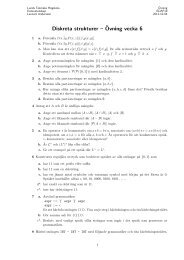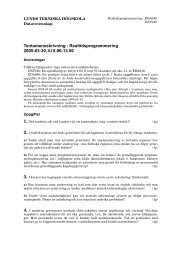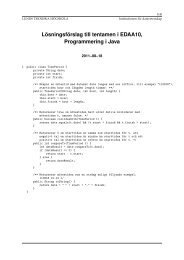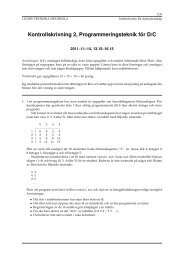JAVA-BASED REAL-TIME PROGRAMMING
JAVA-BASED REAL-TIME PROGRAMMING
JAVA-BASED REAL-TIME PROGRAMMING
Create successful ePaper yourself
Turn your PDF publications into a flip-book with our unique Google optimized e-Paper software.
3. Multi-Threaded Programming<br />
[5]<br />
[6]<br />
[4]<br />
[7]<br />
[3]<br />
[2]<br />
[1]<br />
RTEvent[] buffer<br />
currSize==7<br />
postAt<br />
[8]<br />
fetchAt<br />
[9]<br />
growth<br />
Figure 3.10: Ring buffer as an array with size 12, currently filled with 7 objects<br />
(referenced from the gray elements).<br />
tor, if the operation of the buffer needs to be synchronized with some<br />
other objects (such as an other buffer).<br />
The actual buffer/array is, as shown in Figure 3-10, declared as<br />
protected RTEvent[] buffer;<br />
Construction A new buffer is created by the following constructors, where<br />
the default maxSize is some system dependent DEFAULT_SIZE (currently<br />
64 in our system), and the default lock object is allocated and internally.<br />
The parameters maxSize and lock overrides the defaults:<br />
[10]<br />
[0]<br />
[11]<br />
public RTEventBuffer()<br />
public RTEventBuffer(int maxSize)<br />
public RTEventBuffer(int maxSize , Object lock)<br />
Posting The methods for posting events to the buffer are named doPost,<br />
tryPost, or simply post. The doPost method simply blocks the caller<br />
until the posting is completed. The tryPost gives up if the buffer is full,<br />
either immediately if no timeout is given or after the specified timeout (in<br />
ms). The method post is the generic one that is subject to replacement<br />
in subclasses, whereas the other methods are declared final for reasons<br />
of efficiency.<br />
The post method by default simply calls doPost and returns null. The<br />
return (of type RTEvent) value is useful when subclassing and changing<br />
post to call one of the tryPost methods, which return null when the<br />
event was successfully posted. The event supplied as an argument to<br />
tryPost is returned if not posted (due to the buffer being full). Returning<br />
the unposted event simplifies the calling code. The public posting<br />
methods are:<br />
92 2012-08-29 16:05

















